
The syllabus for EDUC 175E: Learning, Behavior, and Engagement In Context as instructed at James Madison University.

The syllabus for EDUC 175E: Learning, Behavior, and Engagement In Context as instructed at James Madison University.
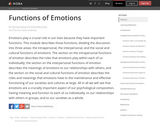
Emotions play a crucial role in our lives because they have important functions. This module describes those functions, dividing the discussion into three areas: the intrapersonal, the interpersonal, and the social and cultural functions of emotions. The section on the intrapersonal functions of emotion describes the roles that emotions play within each of us individually; the section on the interpersonal functions of emotion describes the meanings of emotions to our relationships with others; and the section on the social and cultural functions of emotion describes the roles and meanings that emotions have to the maintenance and effective functioning of our societies and cultures at large. All in all we will see that emotions are a crucially important aspect of our psychological composition, having meaning and function to each of us individually, to our relationships with others in groups, and to our societies as a whole.

Abnormal Psychology is an Open Education Resource written by Alexis Bridley, Ph.D. and Lee W. Daffin Jr., Ph.D. through Washington State University. The book tackles the difficult topic of mental disorders in 15 modules. This journey starts by discussing what abnormal behavior is by attempting to understand what normal behavior is. Models of abnormal psychology and clinical assessment, diagnosis, and treatment are then discussed. With these three modules completed, the authors next explore several classes of mental disorders in 5 blocks. Block 1 covers mood, trauma and stressor related, and dissociative disorders. Block 2 covers anxiety, somatic symptom, and obsessive-compulsive disorders. Block 3 covers eating and substance-related and addictive disorders. Block 4 tackles schizophrenia spectrum and personality disorders. Finally, Block 5 investigates neurocognitive disorders and then ends with a discussion of contemporary issues in psychopathology. Disorders are covered by discussing their clinical presentation and DSM Criteria, epidemiology, comorbidity, etiology, and treatment options.
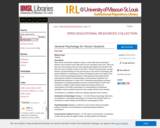
What are the most effective methods to study for a test? What are the meanings of dreams? How do illusions work? With whom are you most likely to fall in love? These are just a few of the questions that have been asked by psychologists since the birth of the field as an area of scientific research in the 1870’s. This text surveys the basic concepts, theories, and pivotal findings over the past 100 years in the science of Psychology, with special emphasis on contemporary concepts and findings focused on the relation of the brain to normal and pathological behaviors. Psychology has long evolved past the psychodynamic influence to include biological, social, learning, motivational, and developmental perspectives, to name a few. Contemporary psychologists go beyond philosophical or anecdotal speculation and rely on empirical evidence to inform their conclusions. Similarly, readers will push beyond pre-existing schemas and misconceptions of the field of psychology to an understanding of contemporary quantitative research methods as they are used to predict and test human behavior.
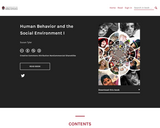
That’s what we are here to find out – Human Behavior and the Social Environment (HBSE) – How do they connect? How does it shape us? Why do we think and feel the way we do?
This will be explored throughout this course by examining human behavior throughout life stage developments and our interactions with the social environment. This course will explore theoretical perspectives in Social Work to help provide a foundation for organizing thoughts about client needs and issues they are seeking supports for. Theories will then be connected to important developmental, social, and cultural issues that present throughout each stage of life to create an overall picture of a client’s experience and how we can use this information to have a better understanding of how people we work with are influenced and why. Knowledge of typical development in each stage of life will also inform the Social Worker if any other supports, resources, or services may be needed.
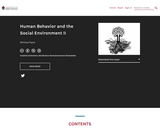
These materials will help students and instructors alike explore human behavior and how it is shaped and impacted by both traditional and non-traditional paradigms. This text will also support the reader in having a deeper understanding of how the environment, in all of its complexity, can affect individuals, families, groups, and communities.
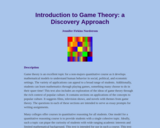
Game theory is an excellent topic for a non-majors quantitative course as it develops mathematical models to understand human behavior in social, political, and economic settings. The variety of applications can appeal to a broad range of students. Additionally, students can learn mathematics through playing games, something many choose to do in their spare time! This text also includes an exploration of the ideas of game theory through the rich context of popular culture. It contains sections on applications of the concepts to popular culture. It suggests films, television shows, and novels with themes from game theory. The questions in each of these sections are intended to serve as essay prompts for writing assignments.
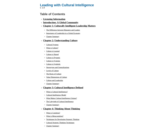
Organizations in the 21st century are in need of culturally intelligent managers and leaders. The pressure to build authentic global networks and to cultivate an appreciation and respect for cultural differences and similarities has driven cultural intelligence to the forefront of diversity and inclusion work.
Preparing today's students to be effective leaders in their professional lives requires that they hone their cultural intelligence as it is vital to working inter- and intra-culturally in today's global economy. This unique ability to identify, recognize, and acknowledge the differences and similarities that exist between and among cultural groups and systems will set their leadership skills apart from the masses. And when applied, cultural intelligence can bridge the gap in cultural misunderstanding by creating awareness, knowledge, and patience of cultural norms and behaviors.
The purpose of Leading With Cultural Intelligence by Mia Moua is to outline the important ideas of cultural intelligence and the steps that must be considered and then practiced to become a culturally intelligent leader. The most important aspect covered within this book is that cultural intelligence is both a strategy and a tool towards cultural competency and proficiency. This book outlines the importance of understanding culture and its impact on organizations, the strategic value of cultural intelligence, and the significance of integrating and practicing cultural intelligence in everyday business life. When all these aspects are properly integrated and applied in the leadership and management process, organizations are more innovative and adaptable to respond to cultural changes.

This course was originally developed for the Open Course Library project. The text used is Math in Society, edited by David Lippman, Pierce College Ft Steilacoom. Development of this book was supported, in part, by the Transition Math Project and the Open Course Library Project. Topics covered in the course include problem solving, voting theory, graph theory, growth models, finance, data collection and description, and probability.
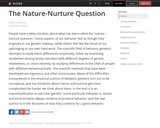
People have a deep intuition about what has been called the “nature–nurture question.” Some aspects of our behavior feel as though they originate in our genetic makeup, while others feel like the result of our upbringing or our own hard work. The scientific field of behavior genetics attempts to study these differences empirically, either by examining similarities among family members with different degrees of genetic relatedness, or, more recently, by studying differences in the DNA of people with different behavioral traits. The scientific methods that have been developed are ingenious, but often inconclusive. Many of the difficulties encountered in the empirical science of behavior genetics turn out to be conceptual, and our intuitions about nature and nurture get more complicated the harder we think about them. In the end, it is an oversimplification to ask how “genetic” some particular behavior is. Genes and environments always combine to produce behavior, and the real science is in the discovery of how they combine for a given behavior.
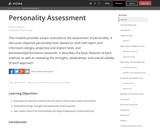
This module provides a basic overview to the assessment of personality. It discusses objective personality tests (based on both self-report and informant ratings), projective and implicit tests, and behavioral/performance measures. It describes the basic features of each method, as well as reviewing the strengths, weaknesses, and overall validity of each approach.